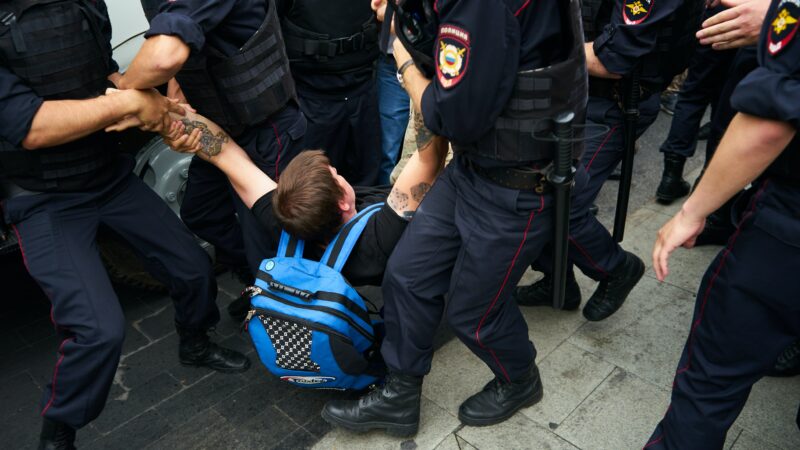Nowadays, practically anyone can be accused of treason.
Originally published on Global Voices

Photo by Valery Tenevoy on Unsplash
This article by Yulia Selikhova was published by Holod Magazine on August 7, 2023. A translated and edited version of this article has been published by Global Voices with the permission from Holod.
Based on statistics from the first seven months of 2023, Russia is expected to witness a higher number of state treason cases in 2023 than in the previous 20 years. The trials usually take place behind closed doors. While earlier high-risk groups included defense enterprise employees, military personnel, and scientists with access to state secrets, nowadays, practically anyone can be accused of treason.
The public is unable to access the details of these accusations, as the content of state secrets itself is deemed classified.
Polina Evtushenko, 24 years old, was born and raised in Tolyatti until she was suddenly accused of state treason in mid-July 2023. On March 1, 2022, merely a week after the start of Russia's full-scale invasion of Ukraine, Polina shared a link on her Instagram page to a petition for the impeachment of Vladimir Putin. She also published several anti-war posts. It is possible that one of these Instagram posts served as a foundation for her accusation.
Now Polina is detained and confined to a pre-trial detention center in the village of Kryazh in the Samara region, far away from her daughter.
‘Spies’ and ‘traitors’
In just the first seven months of this year, there have been four times as many cases of treason initiated than in the entire year of 2022 (82 cases from January to July in 2023 versus 20 cases in 2022).
Evgeny Smirnov, a lawyer from Perviy Otdel [a non-profit association of lawyers that assists in political cases in Russia] emphasizes: “Many of the cases we are monitoring lack case files on court websites. I believe that there may be twice as many cases in reality.”
All terms and articles in the current legislation are very broad and vague, making it difficult even for lawyers or law enforcement officials to interpret the law unequivocally. According to Smirnov, nearly anyone unfamiliar with real cases of treason could unwittingly disclose a state secret in casual conversation.
One treason case a day
The geographic distribution of criminal cases has shifted significantly. Smirnov states, “Previously, 90 percent of cases were concentrated in Moscow, with the remaining 10% in Krasnodar, Saint Petersburg, and occasionally Khabarovsk. However, following the full-scale invasion, cases of treason and espionage have become more prevalent in the regions.”
In the beginning, investigations in the regions took a lot of time. “Now, the FSB has picked up its pace: on average, around 20 criminal cases are initiated per month,” says Smirnov. “This means that one case is initiated every working day.”
The first case of siding with the enemy in 2023 was initiated on the very first working day of the new year, January 9. The report states that the detainee “attempted to travel to Ukraine to participate in combat actions on the side of the VSU.” Every single detail of this case remains unknown: it’s classified.
Smirnov states that investigators follow a pattern: “One case mirrors another, only the surnames change.” He also told Holod that lawyers from the “Perviy Otdel” have recently received many testimonies indicating that detainees were tortured.
No acquittal
According to Holod, between January 1 and July 31, 2023, the media disclosed at least 22 verdicts in cases of treason. The average prison term for “traitors” is 11.5 years of strict regime imprisonment. As of today, there hasn't been a single acquittal in cases of treason.
Prominent individuals sentenced for treason in the first half of 2023 include politician Vladimir Kara-Murza (sentenced to 25 years in a strict regime colony), businessman and Group-IB founder Ilya Sachkov (14 years in a strict regime colony and USD 5500 fine), and scientist Valery Golubkin (12 years in a strict regime colony).
Yet, it is ordinary Russian citizens who are in danger.
Game without rules
Evgeny Smirnov firmly believes that cases of treason and espionage are essential for the state to maintain societal tension. “When the ‘red lines’ are clearly defined, a person knows what can be done and what cannot. In recent years, the state intentionally formulates laws so that a person does not know but only feels what is allowed and what is prohibited,” he says.
On July 21, the first criminal case in Russia involving a financial transfer to Ukraine using cryptocurrencies was initiated.
The young woman Polina Evtushenko probably did not suspect that her Instagram posts with just eight likes could be considered state treason. Evgeny Smirnov informed Holod that she could face up to 15 years of imprisonment.
Tomorrow, anyone could find themselves charged with state treason.
The only way to remain on the safe side is to avoid any communication with foreigners, not read or watch any news other than state-owned media, show no interest in anything, and not ask friends about anything or post anything on social media. As George Orwell wrote, “If you want to keep a secret, you must also hide it from yourself.”
Post a Comment